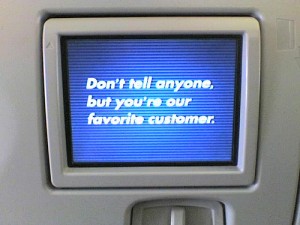Fed-Up Employee Creating Bad PR? Social Media Can Help (Just Ask JetBlue)

We’ve all been at that point, when you’re so frustrated with your work that you just want to grab a beer, inflate the slide and jump out ofthe aircraft, sliding your way to freedom. Those of us with a reality filter know we can’t do that. We’ll lose our jobs, be the subject of ridicule – there will be repercussions, not the least of which will be bad PR for our company, which maybe isn’t so bad after all.
But this week, one flight attendant threw caution to the wind and himself off an airplane, resulting in the company’s mobilization of social media to turn the PR around. And, as Fast Company Magazine notes, they did so expertly.
For the first 48 hours following Slater’s famous beer slide, JetBlue said nothing. Then, on Wednesday, JetBlue made the scantest of acknowledgments. On its “BlueTales” blog, it noted that:
“[…]it wouldn’t be fair for us to point out absurdities in other corners of the industry without acknowledging when it’s about us. Well, this week’s news certainly falls into that category. Perhaps you heard a little story about one of our flight attendants? While we can’t discuss the details of what is an ongoing investigation, plenty of others have already formed opinions on the matter. Like, the entire Internet. (The reason we’re not commenting is that we respect the privacy of the individual. People can speak on their own behalf; we won’t do it for them.)
“While this episode may feed your inner Office Space, we just want to take this space to recognize our 2,300 fantastic, awesome and professional Inflight Crewmembers for delivering the JetBlue Experience you’ve come to expect of us.”
It’s a wily little post, expertly done—mixing cheeky self-deprecation, ostensible privacy concerns, an apt and funny YouTube link (to the Office Space movie), and only the tiniest dose of PR pablum. What’s fascinating, however, is that these 140 or so words constitute almost the entire response to a story that has had every media outlet scrambling all week.
Jetblue has always been pretty good about establishing a casual, friendly tone, and using loyal social media base to get their message out – “Sure, there are blips, as in any business, but basically, we do a great job, and we respond to our customers and people like us because of it.” They created a Customer Bill of Rights that includes benefits like compensation to customers who are involuntarily denied boarding, free movies to customers whose planes are delayed by 3 hours, and $15 credits on future flights if the in-flight entertainment is busted.
Beyond the blog, JetBlue has nearly 1.6 million followers on Twitter, where their customer response ranges from “thanks for the tweet” and “you’re our new favorite customer” to helping customers with specific questions (“Have you called the BOS baggage service office or the SFO office?”) Of course, once you’re actively engaging with an audience, you run the risk of actively engaging with humorists like the extremely well-followed Andy Borowitz, who launched a Twitter war with JetBlue, all but egging on readers to accost flight attendants – JetBlue was not amused. But everything, even responsive and lighthearted customer service, has limits. JetBlue might be friendly, but they’re also a company with liability concerns. Even if it’s clear that Borowitz, a humorist, isn’t serious when he hashtags a tweet with #shitmyjetblueflightattendantsays, once he crosses into suggesting (even in jest) that customers attack flight attendants, JetBlue has to be responsible and drop the humor, if only for fear of legal ramifications.
If you examine the comments on the post referred to above on the BlueTales blog, you’ll see the groundswell of support for the airline, as well as inadvertent brainstorming on next steps. For instance, commenter Matt writes:
This is a goldmine opportunity. You should definitely hire this guy, and have him make a bunch of funny youtube videos about the do’s and dont’s of carryon luggage. Have him try to shove a size 10 carryon into a size 9 overhead, sideways. At the end he could have a little sign off (think Dan Rather’s “Courage!”) and then take the chute out of the plane, like Batman. If you don’t somebody else will, why not get the credit for being fair to someone who is viewed by many as a hero, and at the same time turn some lemon-like bad publicity into some earned advertising lemonade.
It’s too late for this particular suggestion, but Matt was correct on the “if you don’t somebody else will” front; Spirit Air has already released an ad which ” they’ve e-mailed customers a $35 coupon that shows a guy holding two beers and jumping, Steven Slater like, down an inflatable exit slide. “Don’t be blue, slide down to low fares,” says the copy.” (Via AdWeek’s AdFreak blog)
To sum up…what excited me about this whole JetBlue story is that the airline illustrated that social media:
1) Can go beyond spin control and reverse the tide of less-than-ideal PR
2) Can mobilize fans as supporters and as informal focus group on next steps
3) Can distribute additional information that shows they have a sense of humor, but also establishes boundaries when it comes to discussion on something that might have legal ramifications.
What are your thoughts about JetBlue’s response to “The Steven Slater Incident”?
Want more analysis of social media’s role in this week’s events? Check out this post at Michelle Tripp’s BrandForward blog.
This entry was posted by Esther on August 13, 2010 at 2:44 pm, and is filed under Brands and Marketing, News. Follow any responses to this post through RSS 2.0.You can leave a response or trackback from your own site.